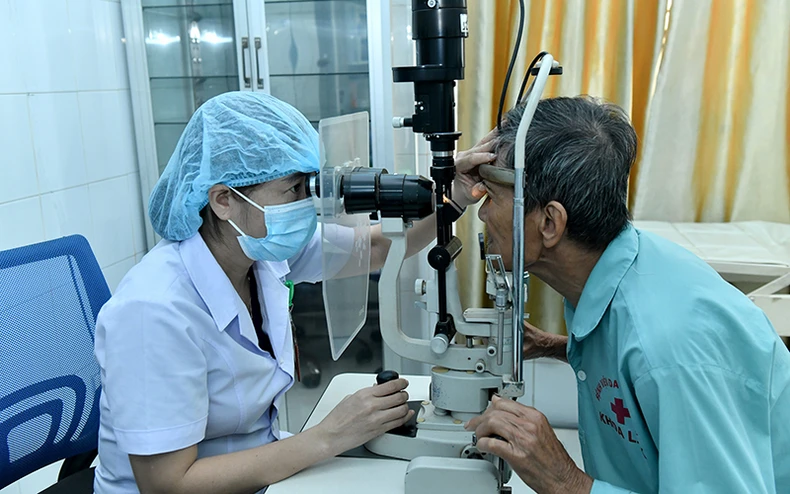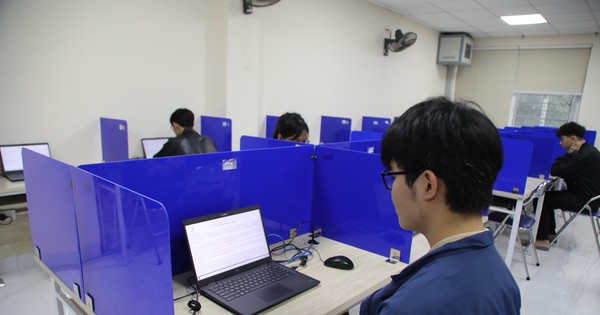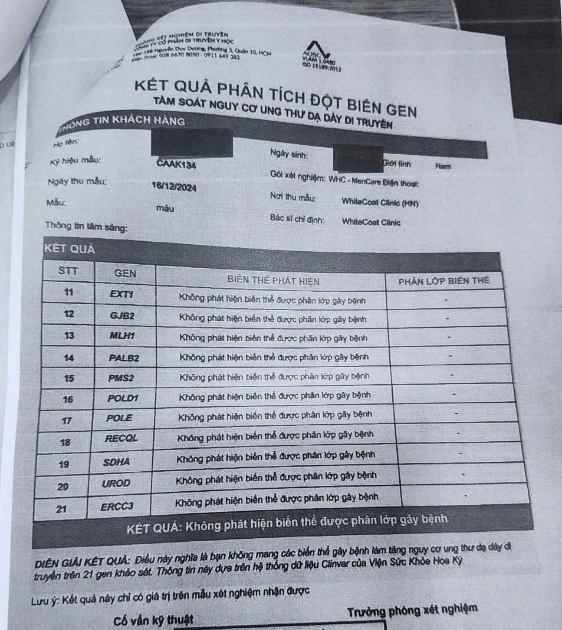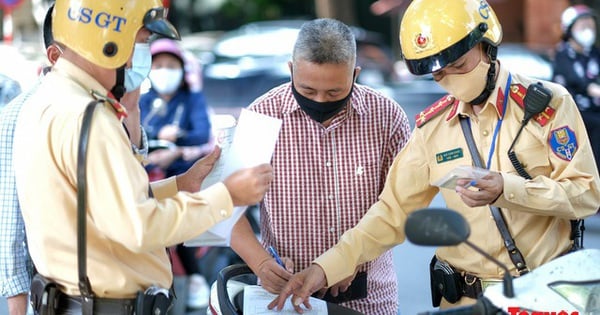According to the Law on Medical Examination and Treatment No. 15/2023/QH15, the National Medical Council has three main tasks including: Presiding over the development and promulgation of a set of tools for assessing the capacity to practice medical examination and treatment; presiding over the organization of examination and assessment of the capacity to practice medical examination and treatment; receiving and resolving petitions and complaints or coordinating with state management agencies in resolving complaints and denunciations about the results of examination and assessment of the capacity to practice medical examination and treatment.
Prof. Dr. Tran Van Thuan, Deputy Minister of Health, Vice Chairman in charge of the National Medical Council, said: The assessment of practitioners' capacity will be carried out from January 1, 2027 for eight professional positions that require a practice license, including: Doctor, physician, nurse, midwife, medical technician, clinical nutritionist, outpatient emergency worker and clinical psychologist and will be implemented on a roadmap.
To implement the national examination to assess professional competence, the National Medical Council will establish specialized committees to carry out tasks in each professional field; accordingly, it will develop a set of tools to assess the capacity to practice medical examination and treatment for professional titles; develop regulations for examining and assessing the capacity to practice medical examination and treatment; organize examinations and assessments of the capacity to practice medical examination and treatment and other professional tasks according to practical requirements.
To effectively perform its assigned functions and tasks, the National Medical Council will preside over and coordinate with social-professional organizations on medical examination and treatment, medical training schools, hospitals and other relevant agencies and organizations to develop detailed plans and gradually complete specific tasks, from developing and promulgating a set of tools to assess medical examination and treatment practice capacity to preparing to organize examinations and assessments of medical examination and treatment practice capacity.
Building a set of tools to assess professional competence means building question banks and exam questions for each subject. Decree No. 96/2023/ND-CP specifies eight professional titles into 32 subjects that will participate in the national exam to assess professional competence (in reality, there are only 23 subjects with enrollment data, there are subjects that have not been trained such as outpatient emergency, clinical psychology...). For example, for the title of doctor, there will be four subjects: medical doctor, traditional medicine doctor, preventive medicine doctor and maxillofacial doctor...
According to international experience, for each subject, at least 25 experts are needed to work in groups for about 12-18 months. This process will include the following steps: Building the structure of the national exam set; compiling exam questions; checking the reliability of exam questions and exam papers. Each step in this process will include activities such as organizing seminars, training, organizing the drafting of theoretical multiple choice questions, organizing the drafting of practical questions, organizing mock exams, analyzing mock exam results and editing/rewriting exam questions and exam papers, evaluating, approving and issuing question banks and exam papers. It will be necessary to build a competency assessment question bank for each subject with an initial size of at least 3,000 questions. On that basis, the National Medical Council will issue exam papers for each exam session. Questions that have been used will be canceled and replaced with new questions.
In the coming time, the National Medical Council will establish committees to develop competency assessment tools for each exam subject to carry out this task. The committee to develop competency assessment tools will plan and work specifically with schools, hospitals and professional associations, gathering experts to build question banks and exam papers.
Organizing a national competency assessment exam is a very heavy, difficult and complicated task. The National Medical Council only plays the role of chair, coordinator and supervisor, on the basis of mobilizing the participation in organizing the exam, contributing facilities and human resources of schools and hospitals nationwide. According to the exam roadmap stipulated in the Law on Medical Examination and Treatment, the National Medical Council will preside over the organization of competency assessment exams for about 13,146 new doctors in 2027; 30,446 doctors, nurses, midwives and medical doctors in 2028; and 36,427 people from 2029 onwards. Thus, from 2029 onwards, the National Medical Council will organize national exams to assess professional competence at least twice a year for 23 candidates, equivalent to 46 exams/year for about 36,000 candidates.
 |
Doctor examines the eyes of an elderly patient at Vinh Linh District General Hospital (Quang Tri). (Photo: THANH TRUC) |
To be able to perform this task well, the Council will assign schools and hospitals with adequate facilities, equipment, and suitable human resources to participate in organizing the exam. The standardized exam facilities for assessing professional competence will be planned to represent the regions, ensuring convenience for candidates and not causing congestion for the two major cities of Hanoi and Ho Chi Minh City. According to estimates, the number of candidates in regions such as: Northern midlands and mountainous region (about 5% of the total number of candidates), Red River Delta region (about 34% of the total number of candidates), North Central and Central Coast region (about 14% of the total number of candidates), Central Highlands region (about 3% of the total number of candidates), Southeast region (about 27% of the total number of candidates) and Mekong Delta region (about 17% of the total number of candidates)...
The national exam has strict requirements for consistency, security, publicity, transparency, convenience and fairness, so it is necessary to increase the application of information technology in the exam. There should be an information technology center in Hanoi to build, operate and maintain the computerized exam system, where question banks and exam papers are centrally stored, and test taker data and exam results are processed. This center plays a role in effectively supporting the implementation of the exam using a remote monitoring system as well as ensuring the completeness and suitability of equipment at each exam site. In parallel with the information technology center, there will be a national exam center to manage the exam in a unified manner for all exam sites nationwide; handle all situations that may arise during the exam; receive and handle complaints and denunciations; and manage the quality of the network of exam facilities, invigilators and supervisors.
In the coming time, the National Medical Council will establish a Competency Assessment Examination Organizing Committee to plan and implement key tasks such as: Developing regulations on assessment of professional competence and criteria for facilities organizing assessment of professional competence; selecting qualified facilities organizing assessment of professional competence; developing collection levels, collection, payment, management and use of costs for assessment of professional competence; developing an information technology project and establishing a national examination management center; developing examination plans and establishing examination councils...
Professor, Dr. Tran Van Thuan affirmed that with the plan, preparation work and specific activities in the coming time, it will contribute to standardizing the team of practitioners before participating in medical examination and treatment, improving the quality of medical human resources, ensuring patient safety and people's health.
Source: https://nhandan.vn/chuan-hoa-doi-ngu-nguoi-hanh-nghe-kham-benh-chua-benh-post831775.html


![[Photo] Prime Minister Pham Minh Chinh and Ethiopian Prime Minister visit Tran Quoc Pagoda](https://vstatic.vietnam.vn/vietnam/resource/IMAGE/2025/4/17/18ba6e1e73f94a618f5b5e9c1bd364a8)
![[Photo] President Luong Cuong receives Kenyan Defense Minister Soipan Tuya](https://vstatic.vietnam.vn/vietnam/resource/IMAGE/2025/4/17/0e7a5185e8144d73af91e67e03567f41)
![[Photo] Promoting friendship, solidarity and cooperation between the armies and people of the two countries](https://vstatic.vietnam.vn/vietnam/resource/IMAGE/2025/4/17/0c4d087864f14092aed77252590b6bae)
![[Photo] General Secretary To Lam receives French Ambassador to Vietnam Olivier Brochet](https://vstatic.vietnam.vn/vietnam/resource/IMAGE/2025/4/17/49224f0f12e84b66a73b17eb251f7278)
![[Photo] Warm meeting between the two First Ladies of the Prime Ministers of Vietnam and Ethiopia with visually impaired students of Nguyen Dinh Chieu School](https://vstatic.vietnam.vn/vietnam/resource/IMAGE/2025/4/17/b1a43ba73eb94fea89034e458154f7ae)
![[Photo] Welcoming ceremony for Chinese Defense Minister and delegation for friendship exchange](https://vstatic.vietnam.vn/vietnam/resource/IMAGE/2025/4/17/fadd533046594e5cacbb28de4c4d5655)




















































![[Video] Viettel officially puts into operation the largest submarine optical cable line in Vietnam](https://vstatic.vietnam.vn/vietnam/resource/IMAGE/2025/4/17/f19008c6010c4a538cc422cb791ca0a1)





































Comment (0)